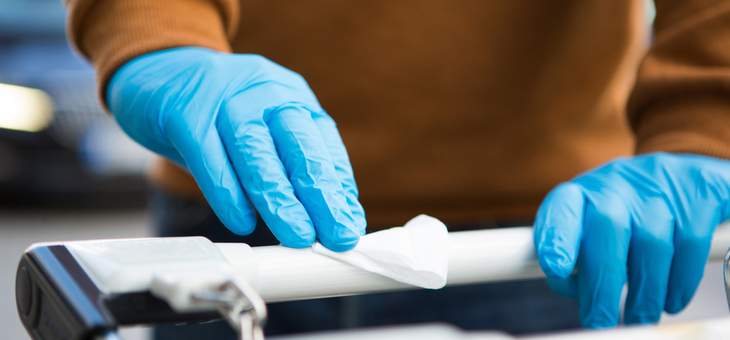There might be debate about the effectiveness of face masks in safeguarding us from coronavirus, but the verdict is in on gloves.
In three words, forget about it.
“If you use gloves, just know that they’re not providing you with any extra protection,” says infectious diseases physician Dr Sumon Chakrabarti.
“I understand the reason why people want to do it – it seems like you’re putting a barrier there,” he says. But he finds that people wearing gloves in public “often wear the same set of gloves everywhere”.
“By doing this, you actually are paradoxically putting yourself more at risk for infections.
“The use of gloves is just too fraught with problems of cleanliness. They act as an extra thing to clean.
“It can give people a false sense of reassurance. People tend to wash their hands less when they’re wearing gloves.”
Dr Jeff Kwong, an infectious diseases specialist at the University of Toronto, concurs.
“People might see (wearing gloves) as an extra layer of protection against things that they’re touching,” he says. “But whether you’re not wearing gloves and you touch something and it’s on your hands, or you are wearing gloves and you touch something … you’re still recommended to wash your hands.”
Asked whether gloves are useful for a visit to the grocery store, MD Arefa Cassoobhoy is blunt.
“The short answer is no. You do not need any kind of gloves at the grocery store.
“Gloves will not protect you. If you touch a contaminated surface, the virus can transfer to your glove just like it could transfer to your fingers, so there’s no added protection from the gloves. If you touch your mouth or nose with the glove, you can pass the virus to yourself. And taking the gloves off after shopping is an especially vulnerable moment, as you can easily transfer any germs on the gloves to your hands and face if you’re not careful.”
You are more likely to catch the virus from the respiratory droplets of a person talking or sneezing near you rather than from an item you touch at the store, Dr Cassoobhoy says.
Social distancing and handwashing are still the most important ways to combat COVID-19.
“Gloves do not replace hand hygiene,” he says. “Given that gloves don’t protect you from the virus, wearing gloves doesn’t save you time from handwashing. You still have to keep up with hand hygiene. That’s the most important way to remove the virus from your hands.
“To protect yourself, you’ll want to use hand sanitiser as you enter and exit the grocery store and wipe down your shopping cart handle with a disinfectant. When you get home, wash your hands well with soap and water for 20 seconds. And clean any other items that might be dirty, like your phone and reusable grocery bags.”
Infectious disease specialist Patricia Dandache, MD says gloves do not give you immunity or permission to touch everything within reach either. “Any germs that might be on your gloves can be transferred to all other surfaces and items you touch. This is why it’s counterproductive to wear gloves yet continue to rummage through your purse or text on your phone while in the store,” she says.
“The coronavirus can enter your body through mucous membranes, like in your nose and mouth. It does not enter your body through your hands, but the hands can transport the viral particles to the mucus membranes. There’s even the possibility that the virus could stick to the latex in gloves better than it could adhere to your own skin.”
Simon Clarke, Associate Professor in Cellular Microbiology at the University of Reading, says “failing to change gloves when needed is no different from failing to wash your hands”.
“It’s important to remember that most gloves that come in large packs are not sterile and are associated with a risk of cross-contamination and spread of disease. This is because they are often used when they aren’t really needed, put on too early, taken off too late or not changed at the appropriate times.”
He reminds us that the gloves used in food preparation are also far from sterile.
“When you see someone wearing gloves in a food preparation or retail environment, it’s worth remembering that they may have had them on for hours and might have handled contaminated material with them. For example, did the person who’s just cooked your burger handle the raw meat with gloves on, only to then give you the cooked product while wearing the same pair of gloves?”
He says gloves “should only ever be worn to protect healthcare workers from blood, bodily fluids or certain drugs”.
However, there is now one other category of person who should wear gloves:those living with someone who has contracted coronavirus.
Health New South Wales offers the following guidelines:
“Wear a surgical mask and disposable gloves when you are in the same room as the person with confirmed infection, or when you touch or have contact with the person’s blood, body fluids and/or secretions, such as sweat, saliva, sputum, nasal mucus, vomit, urine, or diarrhoea.
- make sure your mask covers your nose and mouth at all times
- throw out disposable surgical masks and disposable gloves after use
- wash your hands immediately after removing the surgical mask and gloves.”
What protective measures do you take when doing the shopping?
NOTE – To request an advance copy of the report, please email [email protected]
If you enjoy our content, don’t keep it to yourself. Share our free eNews with your friends and encourage them to sign up.
Related articles:
Supermarkets urged to stop promoting unhealthy foods
Your guide to COVID-19 restrictions
People willing to conceal COVID-19

